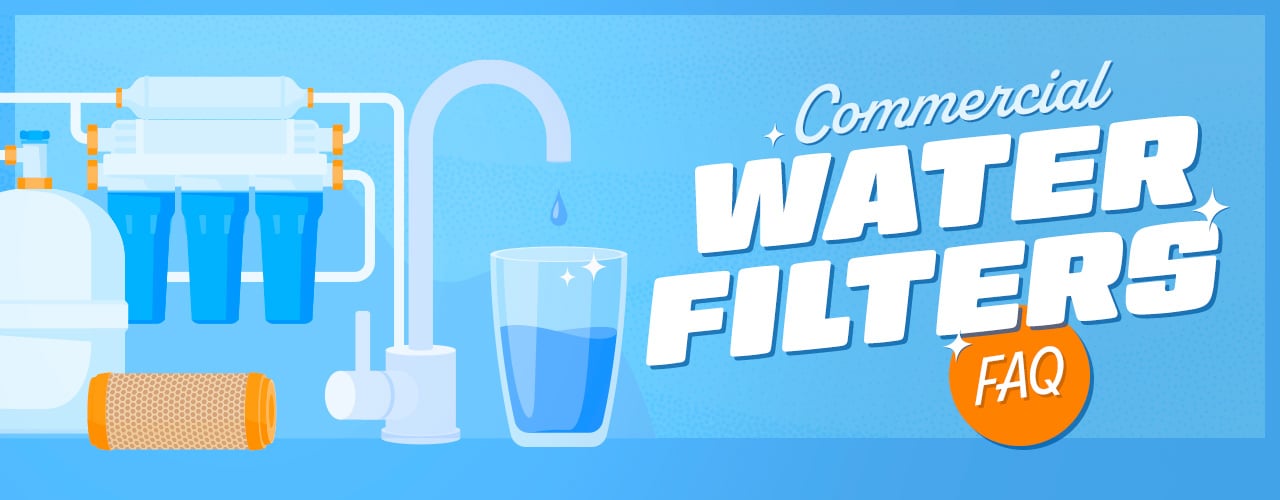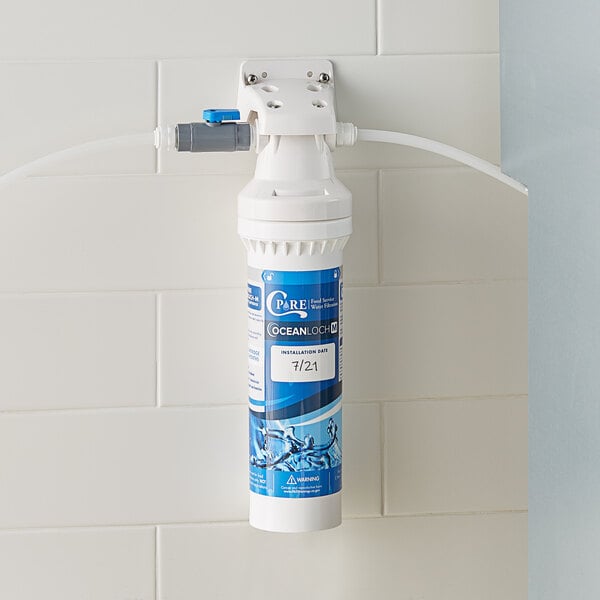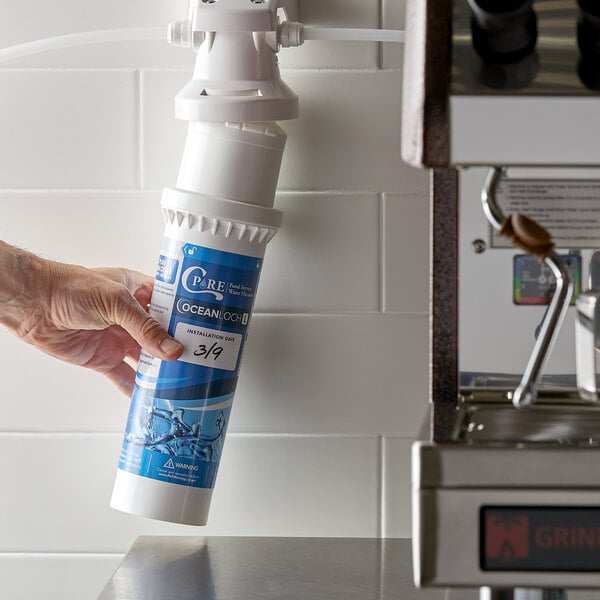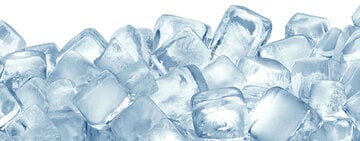
As a restaurant owner, ensuring the quality of your food and beverages is crucial for the success of your business. One key component that often gets overlooked but plays a significant role in maintaining that quality is the water filter system. Water filters are essential for providing clean and safe water for cooking, drinking, and ice production in your restaurant. Filtering your water also helps prevent mineral buildup and sediment accumulation in your equipment, such as coffee makers, ice machines, and steamers. This buildup can lead to clogs, corrosion, and reduced performance, ultimately affecting the lifespan of your equipment. If you have questions about water filters and their importance, we created this FAQ for you.
Shop All Water FiltersAre Water Filters Important?

Yes, water filtration is very important for foodservice businesses. Neglecting water filters can have serious consequences for your restaurant. Without proper filtration, water can carry off-flavors and odors that can taint the taste of your food and drinks. This can lead to customer complaints, negative reviews, and ultimately, a loss of customers. Using unfiltered water in equipment like coffee makers, ice machines, and steamers can cause scale buildup, leading to costly repairs and downtime.
What Types of Equipment Need a Water Filter?
When it comes to keeping your restaurant or bar equipment running smoothly and efficiently, water filters play a crucial role in maintaining the quality of your beverages and food. Let's explore the types of restaurant and bar equipment that benefit from having a water filter installed:
- Commercial Ice Machines: Ice is a key ingredient in many beverages, and having clean, filtered water is essential for producing clear and odor-free ice. Water filters help remove impurities and minerals that can affect the taste and quality of your ice.
- Coffee Makers: For coffee lovers, a good cup of coffee starts with clean, filtered water. Water filters help reduce chlorine, sediment, and other contaminants that can alter the flavor of your coffee and potentially damage your coffee maker over time.
- Dishwashers: Clean dishes are a must in any restaurant or bar, and using filtered water in your dishwasher can help prevent spots and streaks on glassware and dishes. Water filters also help prolong the life of your dishwasher by reducing the buildup of limescale and mineral deposits.
- Steamers and Steam Cookers: Steam equipment relies on water to operate efficiently. By using a water filter, you can prevent mineral deposits from clogging the system, ensuring your steamers and steam cookers function at their best.
- Beverage Dispensers: Whether you're serving soda, juice, or mixed drinks, having filtered water in your beverage dispensers is essential for maintaining the quality and taste of your drinks. Water filters can also help prevent clogs in the dispenser nozzles.
Can a Water Filter System Help Reduce Maintenance Costs for Commercial Equipment?
Yes, using a water filter system can help reduce equipment maintenance for ice machines, coffee makers, and dishwashers. By preventing the buildup of scale and mineral deposits, water filters can prolong the lifespan of equipment and improve overall efficiency.
Do I Need a Water Filter If My Restaurant Already Has a Water Softener?
While water softeners are effective at reducing hard water minerals, they do not remove other contaminants such as chlorine, sediment, or organic matter. It is recommended to use a water filter in conjunction with a water softener to ensure that the water used in your restaurant is clean and safe for consumption.
What Do Water Filters Do?

You probably already know that water filters improve the taste of water, but that's not all they do. Water filtration serves three important purposes:
- Remove Impurities: Commercial water filters are designed to eliminate impurities such as chlorine, sediment, and heavy metals from the water supply. By doing so, they improve the taste, odor, and overall quality of the water used in food and beverage preparation.
- Prevent Scale Build-Up: Scale build-up caused by minerals like calcium and magnesium can wreak havoc on kitchen equipment such as coffee makers, steamers, and ice machines. Commercial water filters help prevent this by reducing the mineral content in the water, thus extending the lifespan of the equipment.
- Protect Equipment: By removing impurities and reducing mineral content, commercial water filters help protect expensive restaurant equipment from damage and corrosion. This not only saves money on repairs but also ensures that your kitchen operates smoothly and efficiently.
How Do Water Filters Work?
Layers of material inside a water filter perform different types of filtration. The first layer is usually a sediment filter. This layer is designed to trap large particles such as dirt, sand, and rust from the water. By removing these impurities, the sediment filter helps prevent clogs and protects the subsequent filtration layers. The next layer typically consists of activated carbon. Activated carbon is highly porous and has a large surface area, making it effective at adsorbing contaminants like chlorine, chemicals, and organic compounds. This layer helps improve the taste and odor of the water.
Some advanced water filters use a reverse osmosis membrane as a filtration layer. Reverse osmosis works by applying pressure to push water through a semipermeable membrane, removing a wide range of impurities including heavy metals, dissolved solids, and bacteria. This process produces clean and pure water for cooking, drinking, and ice-making.
What Are the Types of Water Filters?
Let's take a look at the different types of water filters commonly used in restaurants:
- Carbon Filters: Carbon filters are effective in removing chlorine, volatile organic compounds (VOCs), and unpleasant odors from the water. They are commonly used to improve the taste and smell of water, making it more palatable for drinking and cooking.
- Reverse Osmosis (RO) Systems: RO systems use a membrane to remove a wide range of contaminants from water, including heavy metals, dissolved solids, and bacteria. These systems are highly effective in producing clean and pure water, making them ideal for applications where water quality is critical.
- Ultraviolet (UV) Filters: UV filters utilize ultraviolet light to disinfect water by destroying bacteria, viruses, and other microorganisms. These filters are often used in conjunction with other filtration methods to ensure that water is safe for consumption.
Do Water Filters Remove Bacteria?
Yes, certain water filters can remove bacteria. Look for a commercial water filter that is specifically designed to remove these contaminants. Filters that utilize UV-C technology or have a built-in UV sterilizer are highly effective at eliminating bacteria such as E. coli and Legionella. Reverse osmosis systems are also a great choice for bacteria removal because they can filter out particles as small as 0.0001 microns.
Do Water Filters Remove Chlorine?
Yes, water filters are designed to remove impurities from water, including chlorine. Chlorine is commonly used in municipal water supplies to kill bacteria and other harmful organisms. However, the presence of chlorine can affect the taste and odor of water, which can impact the quality of beverages and food prepared in restaurants. By using a water filter with activated carbon or reverse osmosis technology, restaurant owners can effectively remove chlorine from their water supply, ensuring a cleaner and better-tasting final product for their customers.
Which Water Filters Do I Need?

There are a few key factors to consider when choosing the right water filters for your bar or restaurant. First, determine the size of your operation and the volume of water you use daily to select a filter that can handle the demand. Assess the quality of your water supply to identify any specific contaminants that need to be filtered out. Finally, consider the type of filtration system that best suits your needs, whether it's a reverse osmosis system, carbon filter, or sediment filter. By taking these factors into account, you can ensure that your restaurant has access to clean, safe water for all your cooking and beverage needs.
What's the Difference between OEM Filters and Third Party Filters?
OEM, or Original Equipment Manufacturer, water filters are specifically designed by the manufacturer of the equipment for which they are intended. These filters are engineered to meet the exact specifications and requirements of the equipment, ensuring optimal performance and compatibility. On the other hand, third-party water filters are produced by companies other than the original equipment manufacturer. While these filters may offer a more budget-friendly option, there are some considerations to keep in mind. Third-party filters may not always meet the same quality and performance standards as OEM filters, which could potentially impact the efficiency and lifespan of your equipment.
Keep in mind that using third-party filters could void the warranty of your equipment because manufacturers often require the use of OEM filters to maintain coverage. It is essential to carefully review your equipment's warranty terms and consult with a professional before opting for third-party filters to avoid any potential issues down the line.
When Should I Change My Water Filters?
One important question that often comes up when it comes to water filters for restaurants is, "When should I change my water filters?" It is recommended to change your water filters every 6 to 12 months, depending on the type of filter and the water quality in your area. Regularly changing your water filters ensures that your restaurant maintains high-quality water for cooking, drinking, and cleaning purposes. By staying on top of your filter replacements, you can guarantee that your equipment functions efficiently and your customers are provided with safe and clean water.
How Do I Change My Water Filters?
To change your water filters, start by turning off the water supply and relieving any pressure in the system. Next, follow the manufacturer's instructions to remove the old filter and replace it with a new one. Make sure to flush the system to remove any air pockets before turning the water supply back on. Regularly changing your water filters will help maintain the efficiency of your equipment and provide clean, great-tasting water for your customers.
What Happens If I Don't Change My Water Filters?
Neglecting to change your restaurant's water filters can lead to a range of issues that can impact the quality of your food and beverages. Over time, dirty or clogged filters can result in poor-tasting water, affecting the flavor of your dishes and drinks. Additionally, unchanged filters can cause equipment to work harder, leading to increased energy consumption and potential damage to your appliances. Regularly replacing your water filters is crucial to maintaining the efficiency and quality of your restaurant's operations.
In the hustle and bustle of running a restaurant, it's easy for maintenance tasks like changing filters to slip through the cracks. Owners and staff may prioritize other pressing matters, assuming that water quality is not a top concern. However, the reality is that investing in a quality water filter system and staying on top of filter replacements is a wise decision that can save you money in the long run. By ensuring that your water is clean and free of contaminants, you not only improve the taste and quality of your offerings but also extend the lifespan of your equipment and prevent costly repairs.





